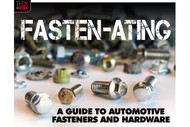Automotive Fasteners and Clips: Essential Components for Vehicle Assembly
Posted by Turbo 6 Restoration on 20th Apr 2023
The automotive industry is one of the largest and most important industries in the world. Every year, millions of vehicles are produced and sold globally. From the smallest of components to the largest and most complex systems, every part of a vehicle is crucial to its performance, safety, and overall success.
One of the most essential components of any vehicle assembly are fasteners and clips. These small but vital components play a critical role in ensuring the structural integrity and functionality of a vehicle. In this blog, we'll explore the importance of automotive fasteners and clips, their different types, and how they are used in vehicle assembly.
What Are Automotive Fasteners and Clips?
Automotive fasteners and clips are mechanical components that are used to join or hold together different parts of a vehicle. They come in a wide range of shapes, sizes, and materials, and are designed to perform specific functions based on their application. Fasteners are used to secure two or more parts together, while clips are used to hold a part in place.
Automotive fasteners can be broadly classified into two categories: threaded and non-threaded. Threaded fasteners are those that have threads, such as bolts, screws, and nuts. Non-threaded fasteners, on the other hand, are those that do not have threads, such as rivets, pins, and clips.
Different Types of Automotive Fasteners and Clips
Automotive fasteners and clips come in many different types, each designed to serve a specific purpose. Here are some of the most common types of fasteners and clips used in vehicle assembly:
- Bolts: Bolts are threaded fasteners that are used to secure two or more parts together. They come in different sizes and grades, and are made from a variety of materials, including steel, titanium, and aluminum.
- Screws: Screws are similar to bolts, but are generally smaller in size and have finer threads. They are used to secure smaller parts, such as interior trim panels and electrical components.
- Nuts: Nuts are used in conjunction with bolts to secure two or more parts together. They come in different sizes and grades, and are made from a variety of materials.
- Rivets: Rivets are non-threaded fasteners that are used to join two or more parts together. They are often used in areas where welding is not practical or possible.
- Clips: Clips are non-threaded fasteners that are used to hold a part in place. They come in a wide range of shapes and sizes, and are used for various applications, such as securing electrical wiring and hoses.
- Washers: Washers are thin, flat discs that are used with bolts and nuts to distribute the load and prevent damage to the parts being fastened. They come in different sizes and materials.
Importance of Automotive Fasteners and Clips
Automotive fasteners and clips are critical components of vehicle assembly. They are responsible for holding together various parts of a vehicle and ensuring its structural integrity. Without them, a vehicle would not be able to function properly or safely.
Proper use of fasteners and clips is also crucial for vehicle safety. In a crash or collision, improperly secured parts can become dislodged, leading to serious injuries or fatalities. This is why automakers must adhere to strict guidelines and regulations when it comes to vehicle assembly and fastener usage.
Conclusion
Automotive fasteners and clips may be small, but they are essential components of vehicle assembly. They play a critical role in ensuring the safety, functionality, and reliability of a vehicle. With their various types and applications, fasteners and clips are designed to meet the specific needs of different vehicle systems and parts. As the automotive industry continues to evolve and innovate


